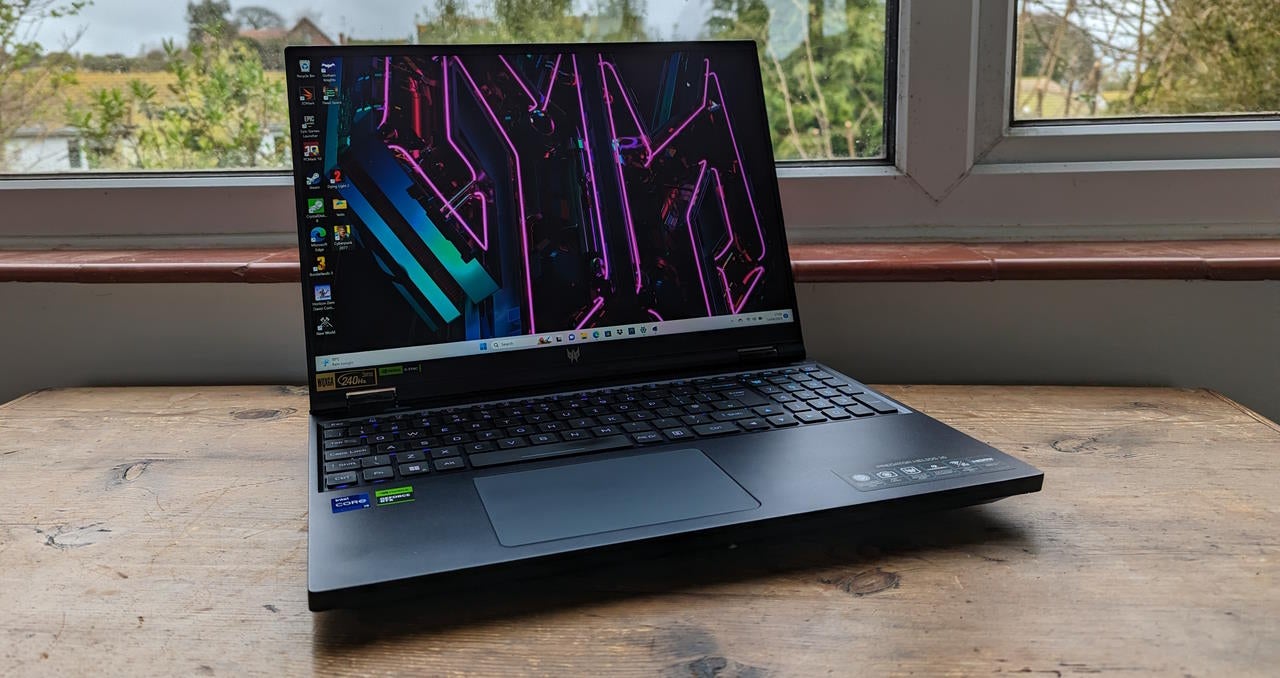Verdict
Despite a noisy cooling system and rough edges around the audio, the Predator Helios 16 is the model of a cutting-edge gaming laptop. £2800 is nobody’s idea of affordable, extremely high-end specs mean it’s actually good value too.
-
Core i9 CPUWith 8 Performance cores, 16 Efficient cores and clock speeds of up to 5.4GHz, the Core i9-13900HX is one incredibly powerful chip -
NVIDIA RTX 4080 mobile GPUWhile it’s not the fastest GPU NVIDIA makes, it’s close enough to power through even the most challenging ray-traced games, especially with DLSS 3 for backup. -
Mini-LED screenWhen it comes to brightness, vibrant colours and HDR effects, mini-LED displays are hard to beat. At 16 inches, this one’s perfect for gaming.
Introduction
Like the Asus ROG Strix Scar 16, the Acer Predator Helios 16 sits firmly in the category of modern laptops that are looking to push games to their maximum. With an Intel Core i9-13900HX and an NVIDIA RTX 4080 mobile GPU, it’s an absolute monster.
We’ve had a few years where a decent gaming PC or laptop hasn’t faced much of a challenge when it comes to running most games maxed out. As long as the code has been properly optimised at launch – we’re looking at you, Gotham Knights and The Last of Us Part I – it’s going to run at a playable frame rate.
The only question was how far you could push that upwards beyond 60fps. Now, however, that’s changing, as more games explore the kind of experimental ray-tracing features we’re seeing in new Unreal Engine titles and the last Cyberpunk 2077 patch. The Acer Predator Helios 16 is here to take on these challenges.
Design and Keyboard
- Simple design, with restrained use of RGB lighting
- RGB-backlit keyboard and super-sized touchpad
- Excellent connectivity with all mod cons
I’m a fan of the Helios 16’s design. It’s got enough gamer bling to look the part, with RGB backlighting on the keyboard as well as a cool illuminated graphic bar behind the screen. But, there’s not so much going on that it distracts you from what’s happening on the 16-inch display. As with most gaming laptops, it has a mostly plastic body, but the lid and keyboard deck are fashioned from a black powder-coated alloy. It all feels solid and robust. With a 357 x 278mm desktop footprint and a 2.9 kg weight, it’s a hefty beast, with vents on both sides, the rear and the base to help with cooling.
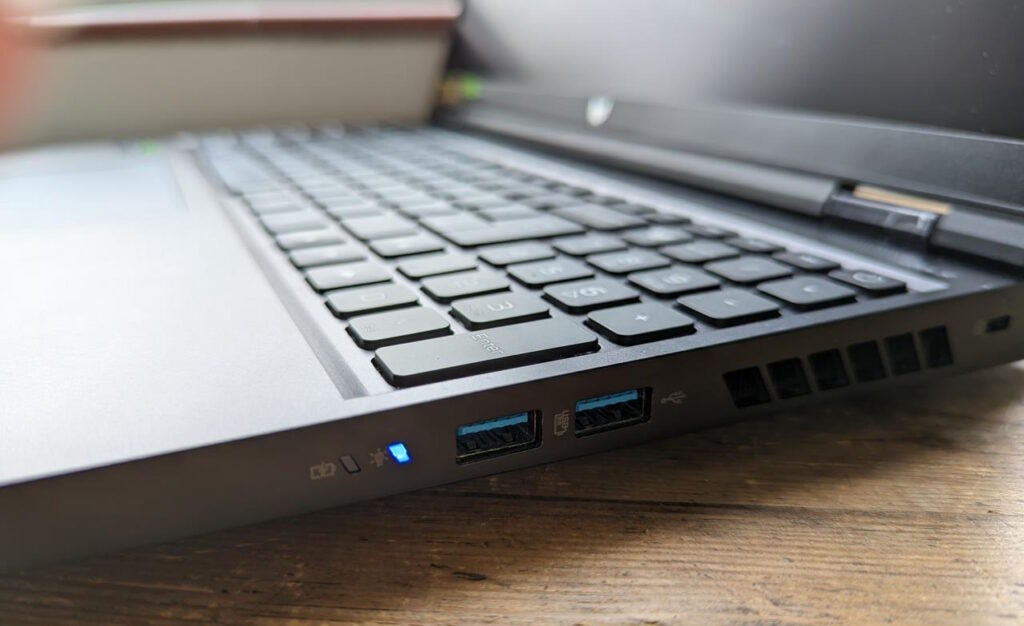
There’s connectivity on all three edges too, with Gigabit Ethernet, USB 3.2 Gen 1 Type A, micro SD and headphone sockets on the left, and two USB 3.2 Gen 2 Type A ports on the right. The rear houses the socket for the massive 330W power supply – itself weighing 850g – along with two USB 3.2 Gen 2 Type-C ports, both of which handle Thunderbolt 4, DisplayPort and USB-PD charging. Add HDMI 2.1, Wi-Fi 6E and Bluetooth 5.1 to the mix, and there’s really nothing missing in terms of ports and sockets. It’s a well-equipped machine.
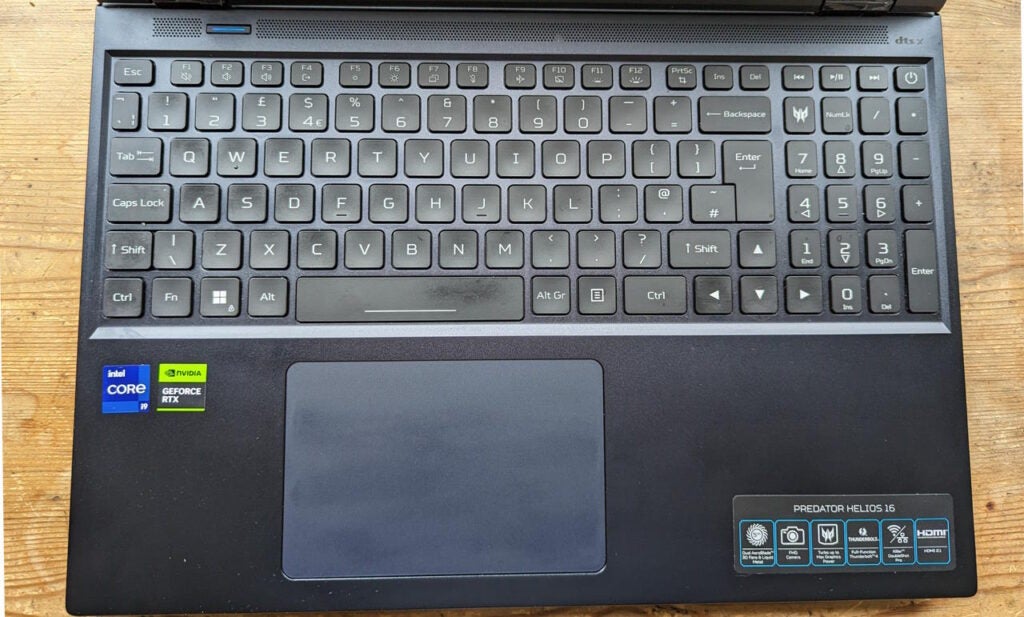
I’m also impressed by the keyboard and the touchpad. I could grumble about the number pad with its slimline keys, the shrunk-down function keys in the top bar or the size of the Shift and Ctrl keys on the left, but I can live with them because the keyboard has a nice, crisp action, just enough travel and a really solid feel. What’s more, the touchpad is a whopper, 127mm wide by 85mm deep, and one of the most responsive I’ve used recently, making general Windows navigation easy. Sure, you’ll still need a mouse for gaming, but for creative apps or productivity, it’s excellent.
Screen
- Mini LED offers spectacular colour
- RGB and DCI-P3 coverage is near-perfect
- Powerful audio can get rough and boxy
A high-end gaming laptop deserves an equally high-end display, and Acer has gone big on a 16-inch Mini LED screen with a 240Hz max refresh and a 2560 x 1600 resolution. Subjectively, it’s brilliant. Blacks are about as deep and dark as you’re going to get outside of OLED screens, and colours are incredibly rich and vibrant. HDR games and video look fantastic. The size and resolution make for some truly immersive gaming.
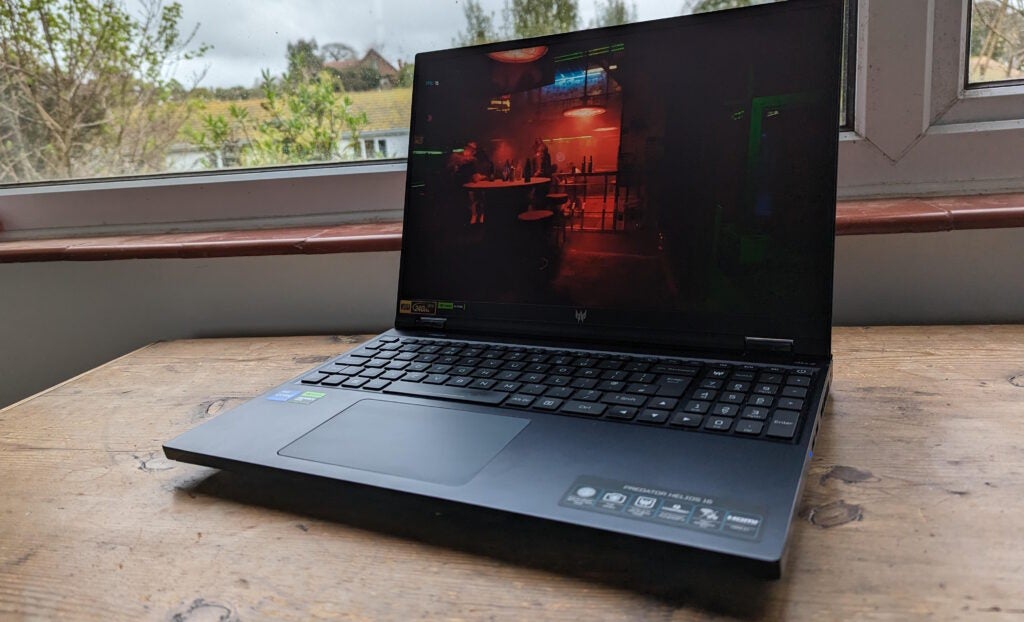
The test results support these impressions. I measured brightness levels at 528.7 nits, black levels at 0.42nits and contrast at 1254.6:1. The screen covers 99.9% of the sRGB gamut and 98.9% of DCI P3. Colour accuracy is nearly flawless, with an average Delta E of 0.42. If you want to switch from playing games to editing video or photos, this display isn’t going to hold you back.
The DTS X speaker system can go loud and does a surprisingly good impression of surround sound, with well-positioned effects that extend far beyond where you know the speakers are. Yet there’s something harsh and a little boxy in the delivery, especially if you whack the volume up. The audio is passable for Netflix or casual gaming, but you’ll need headphones for anything more serious.
Performance
- More than fast enough for creative apps
- Ample 3D power for 144fps-plus frame rates on less demanding games
- Enough ray-tracing capability for cutting-edge RT games
If you want to get the most out of the Helios 16, you need to get to grips with Acer’s Predator Sense utility. This allows you to switch between four profiles – Quiet, Balanced, Performance and Turbo – and adjust individual settings for overclocking and fan settings. Cleverly, there’s a hotkey beneath the left hinge that either cycles through the profiles or turns Turbo on and off. You’ll find Balanced is perfect for everything but gaming, the noisier Performance profile will net you some extra horsepower and higher frame rates. Turbo takes things even further but ups the fan speeds to the extent that noise-cancelling headphones become a must-have. It’s like having a leaf blower sitting on your desk.
Even in Balanced mode, it’s a powerhouse in productivity and creative apps. It’s faster than the mighty Asus ROG Strix Scar 16 in Geekbench 5 and roughly on par in PC Mark 10. Switch to Performance mode and it’s the fastest laptop that I’ve tested in PC Mark 10 and even makes Cinebench R23’s render tests look easy, with a score of 25,922. In Turbo mode, it’ll hit 30,006, putting it only just behind the ROG Strix Scar 16.
For game testing, I stuck to Performance mode with impressive results. You can expect average frame rates of over 144fps at Ultra settings in the likes of Borderlands 2 and Horizon: Zero Dawn at 1080p, though these drop to 111fps and 143fps at 1440p, or 105fps and 127fps at the native 1600p resolution. Still, you can whack that up again using DLSS. On Horizon, engaging DLSS Balanced mode is all it takes to hit an average 149fps at 1600p.
To really push this laptop, I tested it in Cyberpunk 2077’s new cutting-edge Overdrive RTX mode. The Helios 16 managed to still deliver 59.2fps average frame rates at 1600p with DLSS Frame Generation turned on. With the RTX tech turned off, you’re looking at 35fps, so it’s definitely well worth using it.
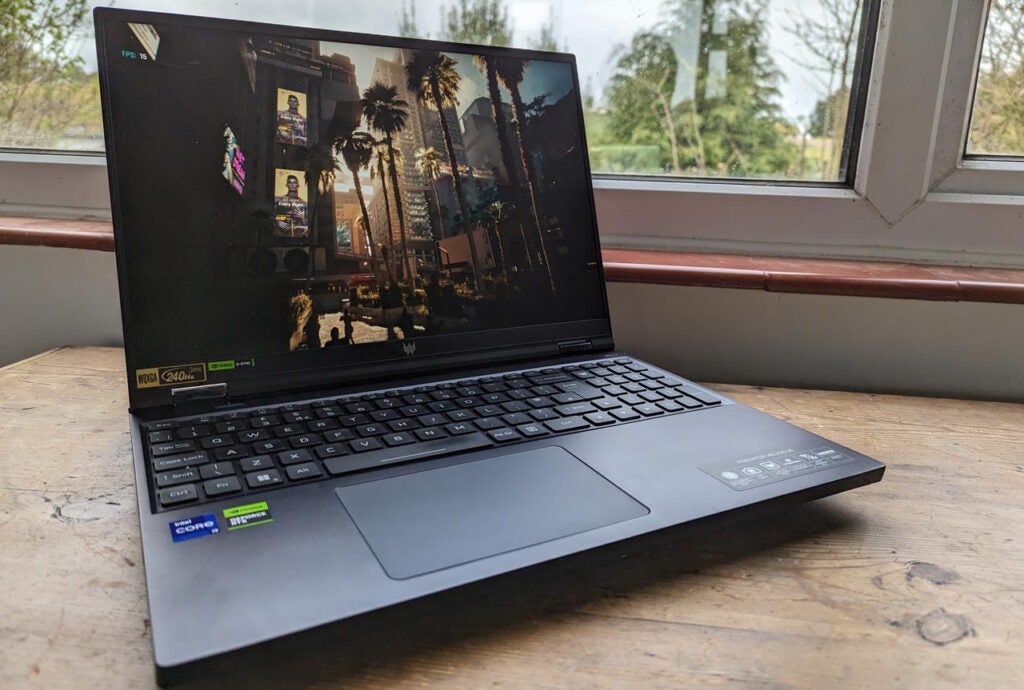
Acer equips the Helios 16 with a 1TB SSD, and it’s a fast one. CrystalDiskMark measured sequential read speeds of 6562MB/sec and write speeds of 4690MB/sec. You won’t get faster without a fancy (and expensive) SSD RAID setup.
Battery Life
- Six and a half hours of everyday use
- Don’t expect more than an hour of gaming
You might expect that, with this spec and screen battery life, isn’t going to be a strong point. However, the Helios 16 managed a credible six hours and 35 minutes in PC Mark 10’s Modern Office battery benchmark. So, for browsing and a little light work, you don’t have to remain plugged into the mains. It’s a different matter if you start using the GPU though. I played the Dead Space remake disconnected from the mains and didn’t even make it to 50 minutes before the juice ran out.
Latest deals
Should you buy it?
You need a laptop that can max out tomorrow’s games
This is a powerful gaming laptop with great connectivity and an excellent screen. It’s expensive at roughly £2800 for the spec reviewed, but that’s actually great value for a laptop with such high-end components and no significant compromises. There are faster laptops out there, but they’re going to cost you even more.
You don’t have the budget or the need for cutting-edge specs
These specs don’t come cheap, and if you’re not fussed about ultra-high refresh rates or ray-traced visuals, you could save a lot of cash with a lower-end gaming laptop. Some gamers might also want some more RGB bling or better sound, and it’s very noisy in its Turbo mode.
Final Thoughts
It’s hard to fault the Helios 16. It has the speed and the features to run today’s most demanding games, and it’s not going to struggle with tomorrow’s.
It has a beautiful screen that will make the most of any new-fangled graphics tech. If I had £3,000 to spend on a gaming laptop, I’d have this one high up on my shortlist. It gives you everything that was great about the awesome ROG Strix Scar 16, but at a lower price.
How we test
Every gaming laptop we review goes through a series of uniform checks designed to gauge key things including build quality, performance, screen quality and battery life.
These include formal synthetic benchmarks and scripted tests, plus a series of real world checks, such as how well it runs when running a AAA game.
We used as our main laptop for at least a week.
Tested the performance via both benchmark tests and real-world use.
We tested the screen with a colorimeter and real-world use.
We tested the battery with a benchmark test and real-world use.
FAQs
The maximum RAM of the Predator Helio 16 is 32 GB.
Trusted Reviews test data
PCMark 10
Cinebench R23
Geekbench 5 single core
Geekbench 5 multi core
Geekbench 6 single core
Geekbench 6 multi core
3DMark Time Spy
CrystalDiskMark Read speed
CrystalMarkDisk Write Speed
Brightness
Black level
Contrast
White Visual Colour Temperature
sRGB
Adobe RGB
DCI-P3
PCMark Battery (office)
PCMark Battery (gaming)
Borderlands 3 frame rate (Quad HD)
Borderlands 3 frame rate (Full HD)
Horizon Zero Dawn frame rate (Quad HD)
Horizon Zero Dawn frame rate (Full HD)
UK RRP
USA RRP
CA RRP
AUD RRP
CPU
Manufacturer
Quiet Mark Accredited
Screen Size
Storage Capacity
Front Camera
Battery
Battery Hours
Size (Dimensions)
Weight
Operating System
Release Date
First Reviewed Date
Model Number
Model Variants
Resolution
HDR
Refresh Rate
Ports
GPU
RAM
Connectivity
Colours
Display Technology
Touch Screen
Convertible?
How we test laptops
Unlike other sites, we test every laptop we review thoroughly over an extended period of time. We use industry standard tests to compare features properly. We’ll always tell you what we find. We never, ever, accept money to review a product.
Used as our main laptop for the review period
Tested for at least a week
Used consistent benchmarks for fair comparisons with other laptops
Reviewed using respected industry benchmarks and real world use
Verdict
Despite a noisy cooling system and rough edges around the audio, the Predator Helios 16 is the model of a cutting-edge gaming laptop. £2800 is nobody’s idea of affordable, extremely high-end specs mean it’s actually good value too.
-
Core i9 CPUWith 8 Performance cores, 16 Efficient cores and clock speeds of up to 5.4GHz, the Core i9-13900HX is one incredibly powerful chip -
NVIDIA RTX 4080 mobile GPUWhile it’s not the fastest GPU NVIDIA makes, it’s close enough to power through even the most challenging ray-traced games, especially with DLSS 3 for backup. -
Mini-LED screenWhen it comes to brightness, vibrant colours and HDR effects, mini-LED displays are hard to beat. At 16 inches, this one’s perfect for gaming.
Introduction
Like the Asus ROG Strix Scar 16, the Acer Predator Helios 16 sits firmly in the category of modern laptops that are looking to push games to their maximum. With an Intel Core i9-13900HX and an NVIDIA RTX 4080 mobile GPU, it’s an absolute monster.
We’ve had a few years where a decent gaming PC or laptop hasn’t faced much of a challenge when it comes to running most games maxed out. As long as the code has been properly optimised at launch – we’re looking at you, Gotham Knights and The Last of Us Part I – it’s going to run at a playable frame rate.
The only question was how far you could push that upwards beyond 60fps. Now, however, that’s changing, as more games explore the kind of experimental ray-tracing features we’re seeing in new Unreal Engine titles and the last Cyberpunk 2077 patch. The Acer Predator Helios 16 is here to take on these challenges.
Design and Keyboard
- Simple design, with restrained use of RGB lighting
- RGB-backlit keyboard and super-sized touchpad
- Excellent connectivity with all mod cons
I’m a fan of the Helios 16’s design. It’s got enough gamer bling to look the part, with RGB backlighting on the keyboard as well as a cool illuminated graphic bar behind the screen. But, there’s not so much going on that it distracts you from what’s happening on the 16-inch display. As with most gaming laptops, it has a mostly plastic body, but the lid and keyboard deck are fashioned from a black powder-coated alloy. It all feels solid and robust. With a 357 x 278mm desktop footprint and a 2.9 kg weight, it’s a hefty beast, with vents on both sides, the rear and the base to help with cooling.

There’s connectivity on all three edges too, with Gigabit Ethernet, USB 3.2 Gen 1 Type A, micro SD and headphone sockets on the left, and two USB 3.2 Gen 2 Type A ports on the right. The rear houses the socket for the massive 330W power supply – itself weighing 850g – along with two USB 3.2 Gen 2 Type-C ports, both of which handle Thunderbolt 4, DisplayPort and USB-PD charging. Add HDMI 2.1, Wi-Fi 6E and Bluetooth 5.1 to the mix, and there’s really nothing missing in terms of ports and sockets. It’s a well-equipped machine.

I’m also impressed by the keyboard and the touchpad. I could grumble about the number pad with its slimline keys, the shrunk-down function keys in the top bar or the size of the Shift and Ctrl keys on the left, but I can live with them because the keyboard has a nice, crisp action, just enough travel and a really solid feel. What’s more, the touchpad is a whopper, 127mm wide by 85mm deep, and one of the most responsive I’ve used recently, making general Windows navigation easy. Sure, you’ll still need a mouse for gaming, but for creative apps or productivity, it’s excellent.
Screen
- Mini LED offers spectacular colour
- RGB and DCI-P3 coverage is near-perfect
- Powerful audio can get rough and boxy
A high-end gaming laptop deserves an equally high-end display, and Acer has gone big on a 16-inch Mini LED screen with a 240Hz max refresh and a 2560 x 1600 resolution. Subjectively, it’s brilliant. Blacks are about as deep and dark as you’re going to get outside of OLED screens, and colours are incredibly rich and vibrant. HDR games and video look fantastic. The size and resolution make for some truly immersive gaming.

The test results support these impressions. I measured brightness levels at 528.7 nits, black levels at 0.42nits and contrast at 1254.6:1. The screen covers 99.9% of the sRGB gamut and 98.9% of DCI P3. Colour accuracy is nearly flawless, with an average Delta E of 0.42. If you want to switch from playing games to editing video or photos, this display isn’t going to hold you back.
The DTS X speaker system can go loud and does a surprisingly good impression of surround sound, with well-positioned effects that extend far beyond where you know the speakers are. Yet there’s something harsh and a little boxy in the delivery, especially if you whack the volume up. The audio is passable for Netflix or casual gaming, but you’ll need headphones for anything more serious.
Performance
- More than fast enough for creative apps
- Ample 3D power for 144fps-plus frame rates on less demanding games
- Enough ray-tracing capability for cutting-edge RT games
If you want to get the most out of the Helios 16, you need to get to grips with Acer’s Predator Sense utility. This allows you to switch between four profiles – Quiet, Balanced, Performance and Turbo – and adjust individual settings for overclocking and fan settings. Cleverly, there’s a hotkey beneath the left hinge that either cycles through the profiles or turns Turbo on and off. You’ll find Balanced is perfect for everything but gaming, the noisier Performance profile will net you some extra horsepower and higher frame rates. Turbo takes things even further but ups the fan speeds to the extent that noise-cancelling headphones become a must-have. It’s like having a leaf blower sitting on your desk.
Even in Balanced mode, it’s a powerhouse in productivity and creative apps. It’s faster than the mighty Asus ROG Strix Scar 16 in Geekbench 5 and roughly on par in PC Mark 10. Switch to Performance mode and it’s the fastest laptop that I’ve tested in PC Mark 10 and even makes Cinebench R23’s render tests look easy, with a score of 25,922. In Turbo mode, it’ll hit 30,006, putting it only just behind the ROG Strix Scar 16.
For game testing, I stuck to Performance mode with impressive results. You can expect average frame rates of over 144fps at Ultra settings in the likes of Borderlands 2 and Horizon: Zero Dawn at 1080p, though these drop to 111fps and 143fps at 1440p, or 105fps and 127fps at the native 1600p resolution. Still, you can whack that up again using DLSS. On Horizon, engaging DLSS Balanced mode is all it takes to hit an average 149fps at 1600p.
To really push this laptop, I tested it in Cyberpunk 2077’s new cutting-edge Overdrive RTX mode. The Helios 16 managed to still deliver 59.2fps average frame rates at 1600p with DLSS Frame Generation turned on. With the RTX tech turned off, you’re looking at 35fps, so it’s definitely well worth using it.

Acer equips the Helios 16 with a 1TB SSD, and it’s a fast one. CrystalDiskMark measured sequential read speeds of 6562MB/sec and write speeds of 4690MB/sec. You won’t get faster without a fancy (and expensive) SSD RAID setup.
Battery Life
- Six and a half hours of everyday use
- Don’t expect more than an hour of gaming
You might expect that, with this spec and screen battery life, isn’t going to be a strong point. However, the Helios 16 managed a credible six hours and 35 minutes in PC Mark 10’s Modern Office battery benchmark. So, for browsing and a little light work, you don’t have to remain plugged into the mains. It’s a different matter if you start using the GPU though. I played the Dead Space remake disconnected from the mains and didn’t even make it to 50 minutes before the juice ran out.
Latest deals
Should you buy it?
You need a laptop that can max out tomorrow’s games
This is a powerful gaming laptop with great connectivity and an excellent screen. It’s expensive at roughly £2800 for the spec reviewed, but that’s actually great value for a laptop with such high-end components and no significant compromises. There are faster laptops out there, but they’re going to cost you even more.
You don’t have the budget or the need for cutting-edge specs
These specs don’t come cheap, and if you’re not fussed about ultra-high refresh rates or ray-traced visuals, you could save a lot of cash with a lower-end gaming laptop. Some gamers might also want some more RGB bling or better sound, and it’s very noisy in its Turbo mode.
Final Thoughts
It’s hard to fault the Helios 16. It has the speed and the features to run today’s most demanding games, and it’s not going to struggle with tomorrow’s.
It has a beautiful screen that will make the most of any new-fangled graphics tech. If I had £3,000 to spend on a gaming laptop, I’d have this one high up on my shortlist. It gives you everything that was great about the awesome ROG Strix Scar 16, but at a lower price.
How we test
Every gaming laptop we review goes through a series of uniform checks designed to gauge key things including build quality, performance, screen quality and battery life.
These include formal synthetic benchmarks and scripted tests, plus a series of real world checks, such as how well it runs when running a AAA game.
We used as our main laptop for at least a week.
Tested the performance via both benchmark tests and real-world use.
We tested the screen with a colorimeter and real-world use.
We tested the battery with a benchmark test and real-world use.
FAQs
The maximum RAM of the Predator Helio 16 is 32 GB.
Trusted Reviews test data
PCMark 10
Cinebench R23
Geekbench 5 single core
Geekbench 5 multi core
Geekbench 6 single core
Geekbench 6 multi core
3DMark Time Spy
CrystalDiskMark Read speed
CrystalMarkDisk Write Speed
Brightness
Black level
Contrast
White Visual Colour Temperature
sRGB
Adobe RGB
DCI-P3
PCMark Battery (office)
PCMark Battery (gaming)
Borderlands 3 frame rate (Quad HD)
Borderlands 3 frame rate (Full HD)
Horizon Zero Dawn frame rate (Quad HD)
Horizon Zero Dawn frame rate (Full HD)
UK RRP
USA RRP
CA RRP
AUD RRP
CPU
Manufacturer
Quiet Mark Accredited
Screen Size
Storage Capacity
Front Camera
Battery
Battery Hours
Size (Dimensions)
Weight
Operating System
Release Date
First Reviewed Date
Model Number
Model Variants
Resolution
HDR
Refresh Rate
Ports
GPU
RAM
Connectivity
Colours
Display Technology
Touch Screen
Convertible?
How we test laptops
Unlike other sites, we test every laptop we review thoroughly over an extended period of time. We use industry standard tests to compare features properly. We’ll always tell you what we find. We never, ever, accept money to review a product.
Used as our main laptop for the review period
Tested for at least a week
Used consistent benchmarks for fair comparisons with other laptops
Reviewed using respected industry benchmarks and real world use


















